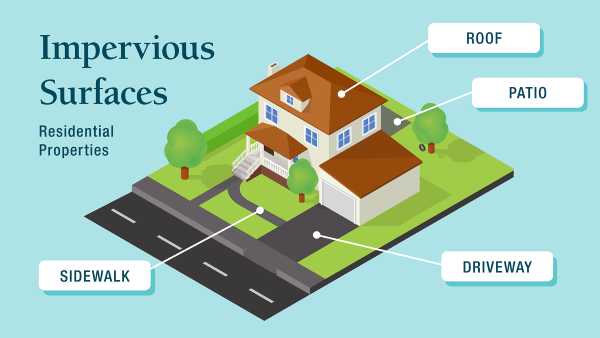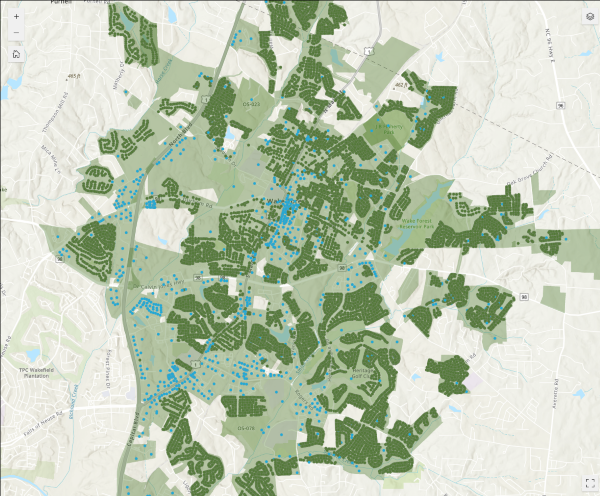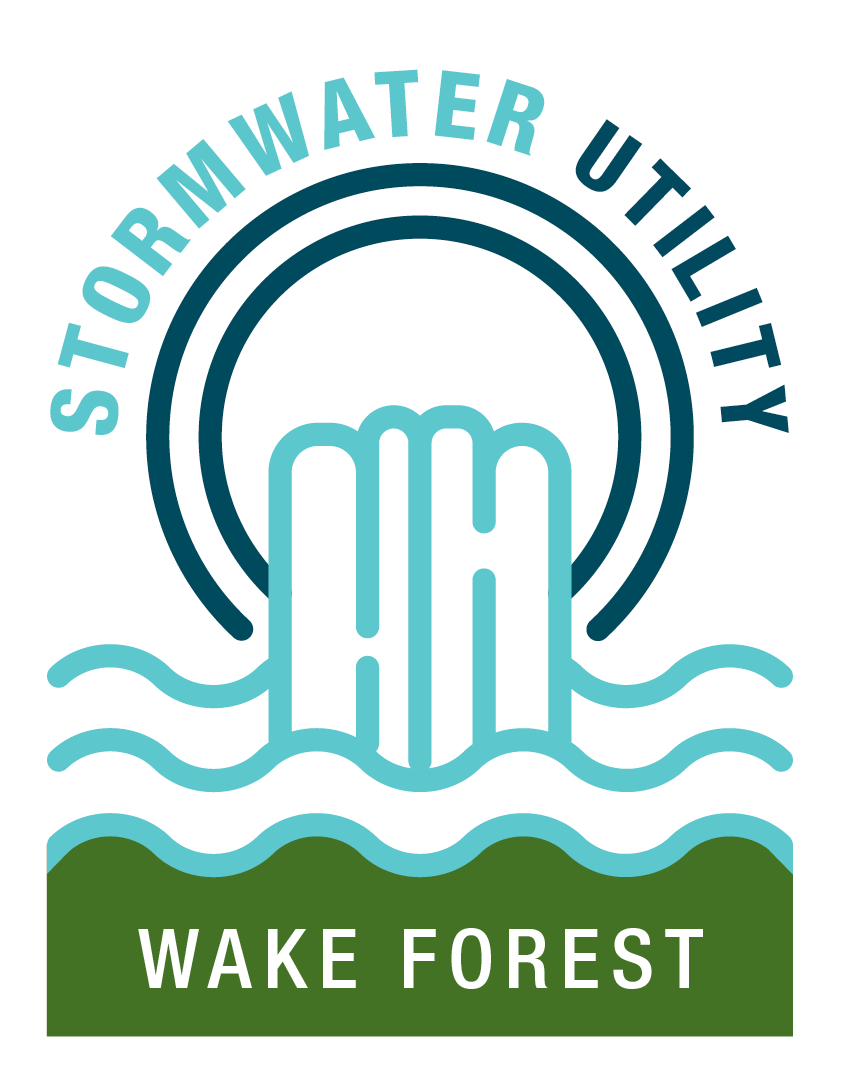Stormwater Utility
Overview
The Town of Wake Forest is pursuing a more proactive approach to stormwater management due to increasingly stringent unfunded stormwater regulations under the MS4 (Municipal Separate Storm Sewer System) Permit and NPDES regulations created by the federal Environmental Protection Agency and subsequently adopted by the NC Department of Environmental Quality (NCDEQ).
NPDES stands for National Pollutant Discharge Elimination System, which is a permit program administered by individual states that controls water pollution by regulating point sources that discharge pollutants into waterways. The Town of Wake Forest must meet the stormwater permitting requirements set forth by these entities.
However, it is the Town's goal to not only meet these new permitting requirements, but to also provide current and future residents with a stormwater management program that will protect our drainage infrastructure, improve the efficiency of the overall drainage system, and ultimately enhance the local environment.
Stormwater Utility Fee
To meet the funding needs for a new Stormwater Management Program, the Town's Board of Commissioners approved a new Stormwater Utility that will go into effect July 2024. The new utility fee will appear as a line item on each property's tax bill or a separate bill depending on the property being within Wake County, Franklin County, or if the property is considered "Exempt."
A stormwater utility fee is a fee charged to property owners to help fund the management and maintenance of stormwater infrastructure and associated drainage systems. The fee is based on the amount of impervious surface on a property, such as roofs, driveways, and parking lots that contribute to the generation of stormwater runoff.
 Stormwater Fee Rates - Based on Impervious Surface
Stormwater Fee Rates - Based on Impervious Surface
An "impervious surface" is a hard surface on a property that does not allow rain to soak into the ground such as, but not limited to, rooftops, carports, driveways, garages, walkways, storage sheds, parking lots, and patios.
Wake Forest roadways and sidewalks are maintained by the Town, and not included in any resident or non-residential property's calculation. Similarly, open bodies of water, a wooden slatted deck, or other material defined as pervious per the NCDEQ Minimum Design Criteria (MDC) are not considered impervious surfaces. (Code of Ordinances Article IV Section 14-77)
There is a separate fee structure for residential and non-residential customers. Rates are generated by using a geographic information system (GIS) and aerial imagery to provide an equitable fee structure for all utility customers.
Includes any material which reduces and/or prevents absorption of storm water. This includes but is not limited to, buildings, roads, pavement, gravel surfaces, etc. Open Bodies of water, a wooden slatted deck, or other material defined as pervious per the NCDEQ Minimum Design Criteria (MDC) are not considered impervious surfaces for the purposes of this article.
Rate Structure
The Stormwater Utility Fee is assessed on all properties within the Wake Forest corporate limits (regardless of tax status) based on total impervious surface square footage (sf).
Residential Rates
| Tier 1 | Tier 2 | Tier 3 |
Impervious Range | 0-1,500 sf | 1,501-4,700 sf | >4,701 sf |
Annual Fee | $44 | $121 | $231 |
Total ERUs | 1 | 2.75 | 5.25 |
| *1 ERU = 1,200 sf of impervious (Average of Tier 1 impervious) | ||
Non-Residential Rates
Tier 1 residential rate sets the rate for non-residential. 1 ERU (Equivalent Unit Rate) = 1,200 sf of impervious surface. 1,200 sf was determined as the average square footage of the Tier 1 rates.
To find the non-residential rate, follow the following equation:
Total Site Impervious (sf)/1,200 (sf) x $44 = Total Annual Stormwater Utility Fee
 Stormwater Utility Fee Informational Map
Stormwater Utility Fee Informational Map
You can view your annual fee based on residential or non-residential rates by visiting our Stormwater Utility Fee Information Map, entering your address in the search bar or navigating to your property.
Billing
Billing for the Stormwater Utility is divided into three categories: Wake County, Franklin County, and Exempt Properties.
Wake County
Residents/Business owners will receive the stormwater utility fee on their tax bill which will be shown as a separate line item on their bill. When paying their tax bill, property owners will also pay for the stormwater utility.
Franklin County
Residents/Business owners will receive a separate bill with their tax bill. The separate bill will include the stormwater utility fee. Property owners will be required to specifically pay this bill.
Exempt Properties
The Town’s Finance department will address Wake County Exempt properties internally. Additional details coming soon!
All bills will be considered “late” starting January 6.
Appeals Process
The Stormwater Utility Fee is assessed on all properties within the Wake Forest corporate limits regardless of tax status based on their total impervious surface square footage.
The Town of Wake Forest utilizes GIS and high-quality aerial imagery through Nearmap to delineate and document the impervious surface total for each property. However, in case of discrepancies, property owners may complete and submit an appeals application for the reasons below.
Ownership
The parcel belongs to someone else.
Impervious Surface
The delineated amount of impervious surface for the parcel is incorrect.
Property Designation
The property is being billed as non-residential, but it is residential (or vice versa).
Tier
Residential property is being billed at the incorrect tier.
Other
If none of these above apply.
Specific documentation may be required to verify the appeal such as as-builts, plats, surveys, deeds, or other certified documents.
Performed within the Town's Laserfiche program, the process will give property owners the ability to receive an initial high-level quality check of the items listed above. If the applicant’s request is denied, he/she will be able to submit specific documentation to further support their request (such as a certified survey of their property’s impervious surface). Select the button below or click on the link within the sidebar of this webpage.
Benefits of a Stormwater Utility Fee
Below is a summary of some of the many benefits a stormwater utility fee may provide:
Improved Water Quality
Stormwater runoff can carry pollutants and contaminants into local waterways, which can harm aquatic life and degrade water quality. The fee helps fund a stormwater management program that can help educate residents on clean water practices and implement programs which aim to reduce pollutants.
Reduced Flooding
Properly maintained stormwater systems can help reduce the likelihood of flooding during heavy rainfall events, protecting properties and infrastructure from damage.
Increased Sustainability
Stormwater Management Programs often include green infrastructure practices, such as rain gardens, bioretention areas, and permeable pavers to help absorb and filter stormwater runoff, reducing the burden on traditional stormwater infrastructure and promoting more sustainable land use practices.
Fairness
The fee is typically structured so that those who generate more stormwater runoff, due to larger impervious surfaces, pay more of the cost of managing and maintaining the stormwater infrastructure. This helps ensure that the cost burden is distributed fairly among property owners based on the level of impact on the system.
A stormwater utility fee can help ensure that the community’s stormwater infrastructure is being properly maintained and managed, benefitting the environment, public health, and our local economy.
FAQs
Why does the Town need a stormwater utility?
The Town of Wake Forest needs a more proactive approach to stormwater management due to increasingly stringent unfunded stormwater regulations under the MS4 (Municipal Separate Storm Sewer System) Permit and NPDES regulations created by the federal Environmental Protection Agency and subsequently adopted by the NC Department of Environmental Quality (NCDEQ). This new utility will also allow us to fund critical projects aimed to maintain and protect our vital watersheds, streams, and wetlands.
How will I be billed for the stormwater utility, and when is payment due?
If your property falls within Wake County, the stormwater utility fee will be added to the property’s corresponding property tax bill sent out in July. Payment for the tax bill will be due by January 5 the following year.
Franklin County Properties will receive a separate bill alongside their property tax bill with the same due date.
Exempt properties and Condominiums, in both Wake and Franklin Counties, will receive an individual bill directly from the Town of Wake Forest. This will be mailed in August or September with the same due date of January 5th.
How often will I be billed for the stormwater utility?
The stormwater utility fee will be an annual fee. There is no current option to change this to a monthly billing fee if the property owner requests.
How is the stormwater utility fee calculated?
The stormwater utility is based on the total square footage of impervious surface on a property.
Impervious “includes any material which reduces and/or prevents absorption of storm water. This includes but is not limited to, buildings, roads, pavement, gravel surfaces, etc. Open bodies of water, a wooden slatted deck, or other material defined as pervious per the NCDEQ Minimum Design Criteria (MDC) are not considered impervious surfaces” per Chapter 14 Article IV of the Town of Wake Forest Code of Ordinances.
What is an “ERU”?
An Equivalent Residential Unit, or ERU, is the unit used to measure the rate for both residential and non-residential properties in an equitable manner.
For the Stormwater Utility, one ERU was calculated based on averaging the total impervious surface for the Tier 1 residential properties: 1 ERU = 1200 SF.
What are the different tiers of the utility?
Residential properties are split into three different tiers shown below:
Tier 1 - $44/yr (10% of the population)
- 0 – 1499 SF impervious
Tier 2 - $121/yr (70% of the population)
- 1500 – 4699 SF impervious
Tier 3- $231/yr (20% of the population)
- 4700+ SF of impervious
Non-Residential is based on the total number of ERUs. A sample calculation is shown below:
Commercial Lot has 60,000 SF of impervious surface between their building footprint, sidewalks, and parking lot.
60,000 SF / 1,200 SF = 50 ERUs
50 ERUs * Tier 1 Rate ($44) = Total Annual Fee ($2,200)
How is the utility calculated for townhomes or multifamily units?
Townhomes and multifamily properties with greater that five units will be charged based off the non-residential fee structure. Condominiums are charged the multifamily rate, however the fee will be issued to the HOA or COA of that complex.
How are impervious surfaces measured?
Each property’s impervious surface was measured using both manual and algorithmic measurements in the Town's Geographic Information System (GIS) using high-quality aerial imagery from Nearmap.
Moving forward, the Town will be maintaining and further refining the impervious measurements utilizing Nearmap AI and manual updates.
What are the utility funds going to be used for?
The Stormwater Utility's Advisory Group made recommendations during the development of the utility to fund Existing services, New services, and Capital Improvement Projects (CIP).
Existing services include, but are not limited to, all existing staff and equipment that assist with Stormwater including Engineers, GIS Analysts, and a public works crew.
New services will include a new Public Works stormwater crew and additional equipment in order to provide a higher level of service of our current ongoing stormwater infrastructure maintenance.
Stormwater CIP will be funded through this utility as well as grant opportunities that arise. The Town of Wake Forest has nearly completed all four (4) watershed studies which has identified numerous project opportunities such as stream restoration, infrastructure upgrades, and projects that would improve water quality.
Is Wake Forest the only municipality with a Stormwater Utility?
No. We're surprisingly one of the last municipalities in Wake County to have one. The UNC School of Government has a NC Stormwater Utility Dashboard where you can see all other municipalities with a Storm Utility, while also comparing their fees.

